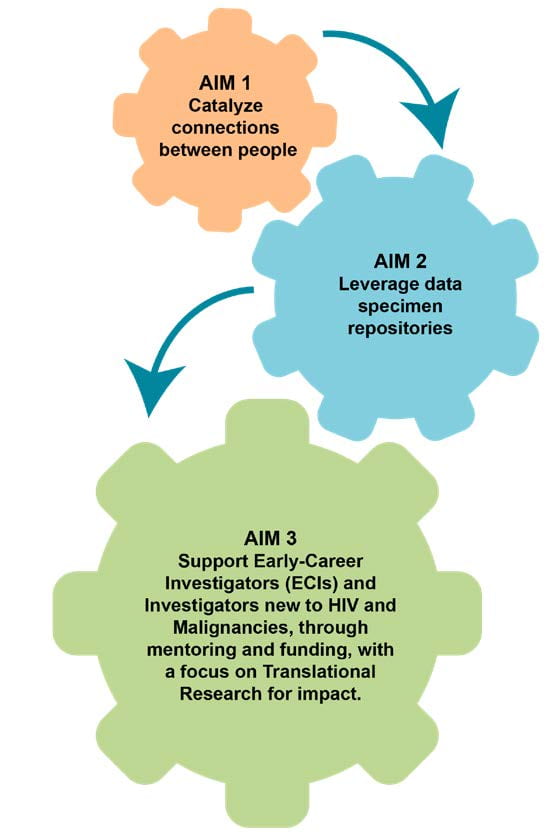Cancer has become a leading cause of death for people living with HIV (PLWH) in both higher and lower income contexts globally. Despite prompt initiation of ART, people with HIV remain 2- to 4-times more likely to die from cancer than similar individuals without HIV infection. This disparity is hypothesized to result from several factors including greater exposure to carcinogens (e.g., tobacco, human papillomavirus (HPV) and other oncogenic viruses), decreased access to cancer screening/prevention interventions, delayed diagnosis, inferior receipt of guideline-concordant oncologic care, and impaired immunologic clearance of dysplastic and malignant cells contributing to increased cancer incidence and poorer survival for most cancers. The underlying mechanisms and effective approaches to mitigate excess risk remain uncertain.
The aims of this SWG are:
- Supporting high-priority, cross-disciplinary HIV research activities at Harvard University and with international colleagues through Developmental and Mentoring Core Scholar Awards.
- Fostering leadership development at Harvard and affiliated international sites through a mentoring program for ECIs and structured training opportunities for their mentors.
- Growing and diversifying the HU CFAR community through formal outreach and orientation activities, linkage with Scientific Working Groups, and funding opportunities that support diversity, equity, and inclusion.

If you are interested in joining or learning about the HIV and Malignancy Scientific Working Group, please complete the brief survey posted below and help guide our activities:
HIV & Malignancy SWG Symposium: “Eliminating HPV-related cancers in your lifetime: A focus on people with HIV”
We recently hosted a morning half-day symposium where presenters shared the latest progress in preventing HPV and HPV-related cancers among individuals with HIV. With the assistance of both global and local investigators, the event also highlighted strategies for moving towards the elimination of these diseases. The recording of this insightful symposium is now available below:
Here is a list of HU CFAR HIV and Malignancy Scientific Working Group initial members:
- Lindsey Baden, MD (BWH/DFCI)
- Alan Engelman, PhD (DFCI)
- Esther Freeman, MD (MGH)
- Benjamin Gewurz, MD, PhD (BWH)
- Musie Ghebremichael, PhD (Ragon Institute)
- Ingrid Katz, MD, MHS (BWH/MGH)
- Kenneth Kaye, MD (BWH)
- Ann Woolley, MD (BWH/DFCI)
- Jonathan Li, MD, MMSc (BWH)
- Kenneth Mayer, MD (Fenway Institute/BILH)
- Aparna Parikh, MD, MPH (MGH Cancer Ctr)
- Krishna Reddy, MD, MS (MGH)
- Mark Siedner, MD, MPH (MGH)
- Virginia Triant, MD, MPH (MGH)
- Athe Tsibris, MD (BWH)
- Peter Vuylsteke, MD (University of Botswana)